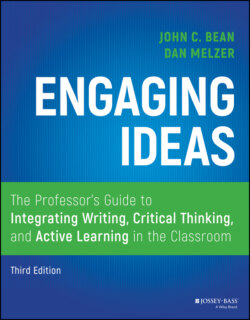Читать книгу Engaging Ideas - John C. Bean - Страница 33
Disciplinary versus Generic Domains for Critical Thinking
ОглавлениеNot all problems, however, are academic problems of the kind that we typically present to students in our classrooms or that we pose for ourselves in doing scholarly research. Academic problems are typically rooted within a disciplinary conversation: to a large extent, these problems are discipline‐specific, because each discipline poses its own kinds of questions and conducts inquiries, uses data, and makes arguments in its own characteristic fashion. As Anne Beaufort (2007) has shown, to think and write like a disciplinary expert, students must draw not only on subject matter knowledge but also on knowledge about the discipline's genre conventions, its methods of argument, its typical kinds of evidence, its ways of referencing other researchers, and its typical rhetorical contexts and audiences. Chapters 3 and 4 develop strategies for helping students think rhetorically about their purpose, audience, genre, and discourse community. Chapter 10 addresses Beaufort's novice‐expert schema in more detail by drawing on rhetorical understanding to teach undergraduate research.
Although academic problems typically have discipline‐specific features, certain underlying aspects of critical thinking are generic across all domains. According to Brookfield (1987), two “central activities” define critical thinking: “identifying and challenging assumptions and exploring alternative ways of thinking and acting” (71). Joanne Kurfiss (1988) likewise believes that critical thinkers pose problems by questioning assumptions and aggressively seeking alternative views. For her, the prototypical academic problem is “ill‐structured”; that is, it is an open‐ended question that does not have a clear right answer and therefore must be responded to with a proposition justified by reasons and evidence. “In critical thinking,” says Kurfiss, “all assumptions are open to question, divergent views are aggressively sought, and the inquiry is not biased in favor of a particular outcome” (2).
